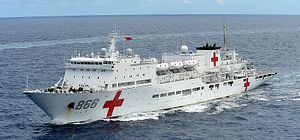China and ASEAN signed a Memorandum of Understanding (MoU) on Disaster Management Cooperation on Monday. Under the agreement, China will provide 50 million RMB ($8.1 million) to build ASEAN’s capabilities to respond to regional disasters. The funds will support the ASEAN Agreement on Disaster Management and Emergency Response Work Progmra, the ASEAN Coordinating Center for Humanitarian Assistance, and the ASEAN Secretariat’s programs to build capacity for disaster management.
ASEAN Secretary-General Le Luong Minh praised the MoU as a “milestone in the developing partnership with China in the area of disaster management.” Chinese Ambassador to ASEAN Yang Xiuping said that the MoU marked the first Chinese grant to ASEAN that would be disbursed by the multilateral mechanism. “Through this grant, China hopes to help countries affected by disasters. By coming together, we can do more for the benefit of the people,” Yang said.
Cooperation on humanitarian assistance and disaster relief is one of the easiest ways to build trust and goodwill between two parties. By its anodyne nature, HA/DR is unlikely to offend even the most hawkish, but it provides ample ground for diplomatic and even military cooperation. As such, many analysts have argued that increased HA/DR cooperation between China and the U.S. can help build mutual trust; it can also be a boon for China-ASEAN cooperation. By providing greater assistance in disaster relief, China can help combat its negative image in some ASEAN member states (notably Vietnam and the Philippines) as an aggressive, revanchist power.
Despite the potential benefits and low costs of participating in HA/DR cooperation, China has been surprisingly slow to seize this opportunity. When Typhoon Haiyan hit the Philippines in 2013, for example, it was a golden opportunity for China to both show off the PLA’s capability to undertake “new historic missions” and for China to win some goodwill in Manila. However, China initially pledged only $100,000 in aid, sparking international criticisms. Imagine if China’s revised offer to donate $1.75 million and to dispatch its hospital ship had been Beijing’s first instinct.
Interestingly, China has been far more active in HA/DR missions far abroad than it has been in its near seas. China’s contributions to the Ebola outbreak in West Africa are historic and seem indicative of China’s wish for a greater role in providing international public goods. After the 2010 Haiti earthquake, China donated $4.4 million worth of humanitarian aid and dispatched a medical team to help with relief efforts.
If China is capable of dispatching aid teams to Haiti and West Africa, it’s certainly capable of doing more to combat disaster affecting its near neighbors in Southeast Asia. And the goodwill China will earn by doing so will be more important, as these neighbors are far more crucial to China’s own strategic interests than countries oceans away. To date, most of China’s humanitarian aid in the region has been delivered on a bilateral basis (for example, China’s donation of $1 million to help Cambodian flood victims late last year). Working with ASEAN will expand the scope of China’s HA/DR operations in the region.
The MoU on disaster relief is a positive step for China-ASEAN relations, and a sign that Beijing is starting to realize the benefits of undertaking HA/DR missions in its own backyard. If China truly wants to replace the U.S. as the guarantor of security in the western Pacific, it needs to first prove it has the capabilities and the will to do so – and providing HA/DR assistance is the perfect way to start.

































